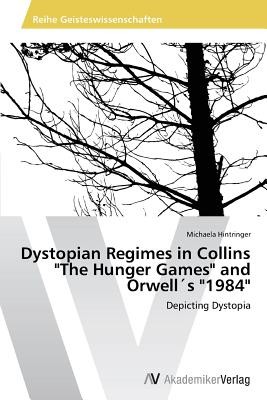
- We will send in 10–14 business days.
- Author: Michaela Hintringer
- Publisher: AV Akademikerverlag
- Year: 2013
- Pages: 108
- ISBN-10: 3639486218
- ISBN-13: 9783639486216
- Format: 15.2 x 22.9 x 0.7 cm, minkšti viršeliai
- Language: English
- SAVE -10% with code: EXTRA
Dystopian Regimes in Collins The Hunger Games and Orwell´s 1984 (e-book) (used book) | bookbook.eu
Reviews
Description
The aim of this analysis is to explore the intertextual relationship between Orwell´s novel Nineteen Eighty-Four (1949) and Suzanne Collins´s dystopian The Hunger Games trilogy (2008-2010). The study is based on a definition of dystopia and its conception of man, which is then related to the totalitarian regimes of Orwell´s Oceania and Collins´s Panem. The features of dystopian society include the use of torture, brainwashing, propaganda and violence, as well as the notion of "reality control". The text attempts to outline the theory of intertextuality and applies it to the critical reading of the two novels. The problem of the distinction between intentional and accidental intertextuality is also addressed, and so are the concepts of originality versus imitation. On a practical level, similarities and differences between the two texts in action and plot are discussed. Also, the intended readership are characterized and the narrative technique is examined. Additionally, the motives of the authors for writing dystopian novels are addressed. One primary ideological difference between the two novels, namely the attitude to rebellion as a means for overcoming a totalitarian regime, is considered. Finally, it provides an answer to the question as to why rebellion is successful in Panem, but impossible in Oceania.
EXTRA 10 % discount with code: EXTRA
The promotion ends in 21d.01:34:50
The discount code is valid when purchasing from 10 €. Discounts do not stack.
- Author: Michaela Hintringer
- Publisher: AV Akademikerverlag
- Year: 2013
- Pages: 108
- ISBN-10: 3639486218
- ISBN-13: 9783639486216
- Format: 15.2 x 22.9 x 0.7 cm, minkšti viršeliai
- Language: English English
The aim of this analysis is to explore the intertextual relationship between Orwell´s novel Nineteen Eighty-Four (1949) and Suzanne Collins´s dystopian The Hunger Games trilogy (2008-2010). The study is based on a definition of dystopia and its conception of man, which is then related to the totalitarian regimes of Orwell´s Oceania and Collins´s Panem. The features of dystopian society include the use of torture, brainwashing, propaganda and violence, as well as the notion of "reality control". The text attempts to outline the theory of intertextuality and applies it to the critical reading of the two novels. The problem of the distinction between intentional and accidental intertextuality is also addressed, and so are the concepts of originality versus imitation. On a practical level, similarities and differences between the two texts in action and plot are discussed. Also, the intended readership are characterized and the narrative technique is examined. Additionally, the motives of the authors for writing dystopian novels are addressed. One primary ideological difference between the two novels, namely the attitude to rebellion as a means for overcoming a totalitarian regime, is considered. Finally, it provides an answer to the question as to why rebellion is successful in Panem, but impossible in Oceania.


Reviews